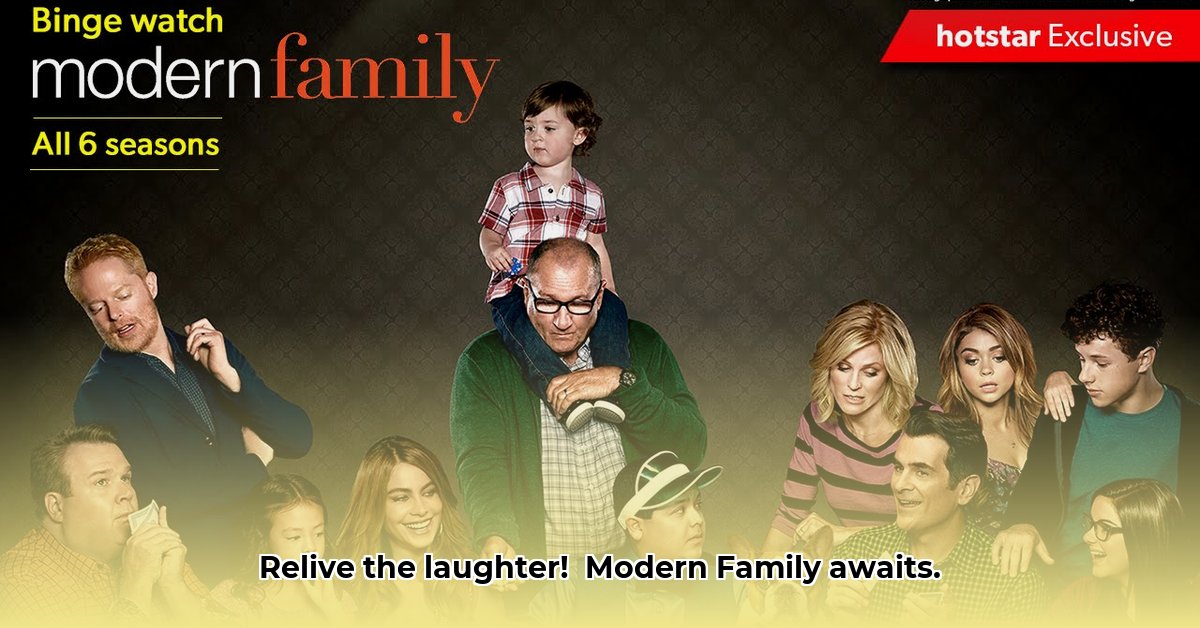
Dive into the world of Modern Family, and you'll quickly grasp its enduring appeal. More than just a sitcom, it's a cultural phenomenon that reshaped television's portrayal of the modern family. For eleven seasons, the show cleverly intertwined the lives of three distinct families – Jay Pritchett, Gloria Delgado-Pritchett, and their son Manny; Claire Dunphy, Phil Dunphy, and their children Haley, Alex, and Luke; and Mitchell Pritchett, Cameron Tucker, and their adopted daughter Lily – creating a hilarious and poignant tapestry of contemporary family life. Its initial success was undeniable, swiftly becoming a ratings champion and a critical darling. But what truly distinguishes Modern Family, and how does its legacy continue to resonate today?
More Than Just a Laugh Track: The Show's Ingenious Approach to Comedy
Modern Family eschewed tired sitcom tropes. It masterfully blended observational humor with slapstick and witty dialogue. The mockumentary style, featuring frequent asides and confessionals, imbued the show with a unique personality. Those hilarious cutaways, those rapid shifts in perspective? They became a signature element, adding layers of charm and perfectly timed comedic beats. While some critics found these cutaways repetitive in later seasons, their overall impact on enhancing humor and character development remains undeniable. The show's success powerfully illustrates how innovative storytelling can revitalize the classic sitcom format. The writers cleverly used this format not just for broad comedic scenarios but also to explore the complex emotional lives of its characters. Did the show's comedic approach always successfully navigate sensitive topics? This is a question that warrants further exploration, especially in light of the show's attempts at addressing important social issues.
Diverse Families, Diverse Perspectives: Representation on Screen
Modern Family bravely tackled the representation of diverse family structures on network television. It showcased a gay couple raising a child, a blended family navigating cultural differences, and a multi-generational dynamic challenging traditional family roles. This representation was groundbreaking, offering a much-needed reflection of evolving social norms. The show aimed for nuanced portrayals, highlighting both the joys and challenges inherent in each family type. However, the show wasn't without its detractors. Some argued that certain minority groups were depicted stereotypically, raising crucial questions about the show's overall success in achieving truly inclusive representation. Ongoing research continues to analyze the show’s portrayal of diverse family units and its impact on viewers. This ongoing critical conversation underscores the need for continuous examination of media representation's evolving nature.
Beyond the Screen: Modern Family's Cultural Impacts
Modern Family's influence reaches far beyond its initial triumph. Its portrayal of diverse families subtly yet profoundly altered the landscape of family-oriented sitcoms. The show normalized what was once considered unconventional, paving the way for a more inclusive television landscape. Its mockumentary style also influenced subsequent sitcoms, demonstrating the show's ability to set trends while remaining true to its comedic core. The show’s success isn’t solely measured in ratings; it also spurred broader societal conversations about family dynamics, diversity, and the ever-shifting definition of family. This wider cultural conversation might well be its most enduring legacy. How significant was this cultural shift, and did it truly impact societal attitudes towards diverse families? These are important questions that deserve further study.
A Lasting Legacy: Why Modern Family Still Matters
Modern Family's lasting legacy reveals a show that expertly blended humor and heart to capture a specific moment in time. Its comedic brilliance is undeniable, and its attempts at representing diverse families were pioneering for network television. While certain aspects of its representation have faced justifiable criticisms and require further academic scrutiny, its positive impact on societal perceptions of family structures is difficult to overlook. Modern Family remains a show worth revisiting, not only for its laughs but also for its insightful exploration of family dynamics and its lasting contribution to television's evolution. Its enduring popularity suggests a continued resonance with audiences, prompting reflection on both its strengths and weaknesses. It successfully balanced comedy and emotional depth—a delicate act that contributed to its powerful and lasting impact. The show's enduring popularity continues to spark discussion about its successes and shortcomings, cementing its place in television history.
Key Takeaways:
- Modern Family significantly expanded television's representation of diverse family structures.
- The show's popularity helped normalize different family configurations, promoting inclusivity.
- Its comedic approach to sensitive topics was both innovative and potentially problematic, warranting further analysis.
- While influential, Modern Family also faced criticism for its sometimes superficial treatment of complex social issues.